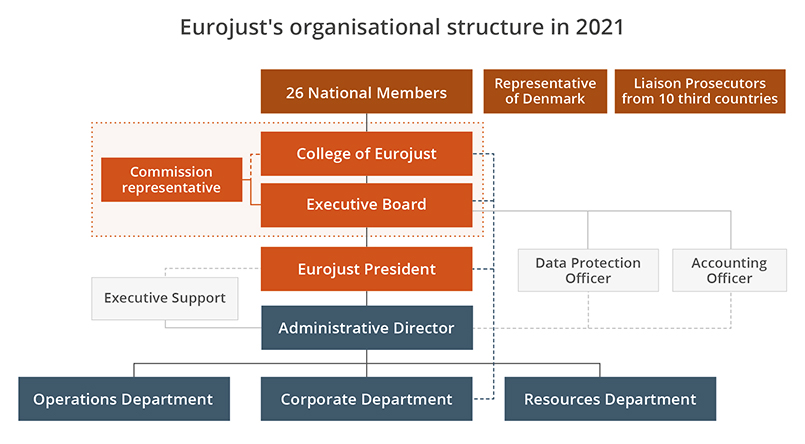Efficient resource allocation and decision-making
As one of the final steps in bringing Eurojust’s internal working methods fully in line with the Eurojust Regulation, in 2021 the College adopted decisions on workflows and College Working Groups to address the methods Eurojust uses to prioritise projects, to ensure transparency in internal decision-making and to solidify the role of the Executive Board in these processes. The new internal rules also ensure that powers of the College and the national authorities are safeguarded in Eurojust governance and make it possible to use resources wisely.
Protecting personal data
Working on the frontline of criminal investigations and prosecutions, Eurojust comes into regular contact with operational personal data. The Agency also processes various categories of administrative personal data as part of its daily activities. By applying the highest standards in data protection, Eurojust ensures the fundamental rights of all individuals.
In October 2021, a team from the EDPS performed an audit of Eurojust for the first time. The extensive audit focused on operational workflows of Eurojust and found that the Agency is compliant with the legislative framework and with certain necessary improvements that will be brought about by the eventual launch of the new CMS.
Strategic planning: MAS 2022-2024
On 12 October, the College approved Eurojust’s Multi-Annual Strategy for 2022-2024. The MAS defines Eurojust’s mission and vision for the period ahead and sets out five high-level objectives for future work.
Amended rules on access to documents
In December 2021, the College approved amendments to the Eurojust rules on access to documents. The changes will make the process of deciding on requests for access to documents more streamlined and define the roles and tasks in the process.
Workflows with EPPO
Based on the Working Arrangement concluded between Eurojust and the EPPO, the agendas of the Executive Board meetings have been shared with the EPPO since September 2021, and the EPPO was invited to attend a College meeting.
Adoption and implementation of the anti-fraud strategy 2021-2024
Eurojust adopted a new anti-fraud strategy on 21 June 2021 after conducting a fraud-risk assessment in the first half of 2021, which confirmed that the risk of fraud in the Agency remains relatively low.
The strategy includes five objectives:
- To continue enhancing fraud awareness through efficient and targeted communication.
- To continue raising awareness on ethics and integrity.
- To continue raising awareness on internal procedures for reporting and handling potential fraud cases.
- To focus on mitigating the risk of fraud in identified risk areas of the Agency.
- To identify process improvements.
These five objectives translate into concrete actions, which will be enforced throughout the years. These actions include organising refresher training courses on ethics, integrity and whistle-blowing, as well as improving policies/procedures to tackle residual risks. Eurojust seeks to implement the strategy for the 2021-2024 period.
Budget

Eurojust’s 2021 budget was initially approved at EUR 43.8 million. During the final quarter of the year, the Commission approved two internal transfers of additional commitment appropriations to Eurojust for commencing the development of its new CMS. Two budget amendments in October and December 2021 enabled the Agency to incorporate the respective additional amounts of EUR 7 million and EUR 2.5 million, increasing its 2021 budget to EUR 53.3 million.
Despite the inevitable impact of COVID-19 measures on Eurojust’s activities, the Agency implemented 99.97% of its budget for 2021. Capitalising on the efficiency opportunities and surpluses created by the pandemic, the Agency continued its investments in its ICT and physical infrastructure to upgrade it and better support the remote working arrangements, and it also funded preparatory activities for the new CMS.
Furthermore, in 2021 Eurojust used the EUR 1 million contribution of the Kingdom of Denmark to recruit additional contract staff to cover specific high-priority operational needs.
In addition, the Agency coordinated and supported a number of operational projects based on external funding agreements, namely:
- The EuroMed Justice programme, with a budget of EUR 5 million for 2020-2023;
- The SIRIUS project, with a budget of EUR 1.3 million for 2021-2024; and
- The EUIPO enhanced cooperation actions, with a budget of EUR 0.75 million for 2021-2024.
Eurojust post-holders and staff
By the end of 2021, Eurojust had 337 post-holders, including 26 National Members, assisted by 57 Deputies and Assistants seconded from the judicial authorities of the Member States to Eurojust, performing the core operational activities and together forming the College of Eurojust, which also performs the function of Management Board.
In 2021, the College welcomed two new National Members:
- for Romania, Daniela Buruiana
- for Cyprus, Zacharias Symeou
237 staff members (Temporary Agents and Contract Agents) and 17 Seconded National Experts (SNEs) worked in Eurojust’s Administration, reporting to the Administrative Director. 27 new staff members and 9 SNEs were recruited during the year.
An inclusive workplace
This is the first working place in my whole career where I feel not only accepted or tolerated but also very welcome. When I came into the building and met my colleagues from all over Europe, they gave me the impression that I belong with them – I am part of the Eurojust family.
Eurojust strives to be an inclusive and diverse workplace and places strong emphasis on raising awareness of these values. A diversity and inclusion campaign is planned to enable a shared understanding of the best practices in this field.
Additional information
The Consolidated Annual Activity Report (CAAR) provides a detailed overview of all activities, as included in the Eurojust Work Programme, budget execution and staffing policies, as well as the implementation of internal controls and risk management. The 2021 CAAR and the Eurojust College Assessment thereof will be submitted to the budgetary authority by 1 July 2022.

